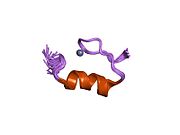| HIVEP1 | |||||||||||||||||||||||||||||||||||||||||||||||||||
|---|---|---|---|---|---|---|---|---|---|---|---|---|---|---|---|---|---|---|---|---|---|---|---|---|---|---|---|---|---|---|---|---|---|---|---|---|---|---|---|---|---|---|---|---|---|---|---|---|---|---|---|
 | |||||||||||||||||||||||||||||||||||||||||||||||||||
| |||||||||||||||||||||||||||||||||||||||||||||||||||
| Identifiers | |||||||||||||||||||||||||||||||||||||||||||||||||||
| Aliases | HIVEP1, CIRIP, CRYBP1, GAAP, MBP-1, PRDII-BF1, Schnurri-1, ZAS1, ZNF40, ZNF40A, human immunodeficiency virus type I enhancer binding protein 1, HIVEP zinc finger 1 | ||||||||||||||||||||||||||||||||||||||||||||||||||
| External IDs | OMIM: 194540; MGI: 96100; HomoloGene: 1596; GeneCards: HIVEP1; OMA:HIVEP1 - orthologs | ||||||||||||||||||||||||||||||||||||||||||||||||||
| |||||||||||||||||||||||||||||||||||||||||||||||||||
| |||||||||||||||||||||||||||||||||||||||||||||||||||
| |||||||||||||||||||||||||||||||||||||||||||||||||||
| |||||||||||||||||||||||||||||||||||||||||||||||||||
| Wikidata | |||||||||||||||||||||||||||||||||||||||||||||||||||
| |||||||||||||||||||||||||||||||||||||||||||||||||||
Zinc finger protein 40 is a protein that in humans is encoded by the HIVEP1 gene.
Members of the ZAS family, such as ZAS1 (HIVEP1), are large proteins that contain a ZAS domain, a modular protein structure consisting of a pair of C2H2 zinc fingers with an acidic-rich region and a serine/threonine-rich sequence. These proteins bind specific DNA sequences, including the kappa-B motif (GGGACTTTCC), in the promoters and enhancer regions of several genes and viruses, including human immunodeficiency virus (HIV). ZAS genes span more than 150 kb and contain at least 10 exons, one of which is longer than 5.5 kb (Allen and Wu, 2004).
References
- ^ GRCh38: Ensembl release 89: ENSG00000095951 – Ensembl, May 2017
- ^ GRCm38: Ensembl release 89: ENSMUSG00000021366 – Ensembl, May 2017
- "Human PubMed Reference:". National Center for Biotechnology Information, U.S. National Library of Medicine.
- "Mouse PubMed Reference:". National Center for Biotechnology Information, U.S. National Library of Medicine.
- Gaynor RB, Muchardt C, Diep A, Mohandas TK, Sparkes RS, Lusis AJ (Jul 1991). "Localization of the zinc finger DNA-binding protein HIV-EP1/MBP-1/PRDII-BF1 to human chromosome 6p22.3-p24". Genomics. 9 (4): 758–61. doi:10.1016/0888-7543(91)90371-K. PMID 2037300.
- ^ "Entrez Gene: HIVEP1 human immunodeficiency virus type I enhancer binding protein 1".
Further reading
- Omichinski JG, Clore GM, Robien M, et al. (1992). "High-resolution solution structure of the double Cys2His2 zinc finger from the human enhancer binding protein MBP-1". Biochemistry. 31 (16): 3907–17. doi:10.1021/bi00131a004. PMID 1567844.
- Nakamura T, Donovan DM, Hamada K, et al. (1990). "Regulation of the mouse alpha A-crystallin gene: isolation of a cDNA encoding a protein that binds to a cis sequence motif shared with the major histocompatibility complex class I gene and other genes". Mol. Cell. Biol. 10 (7): 3700–8. doi:10.1128/mcb.10.7.3700. PMC 360816. PMID 1694016.
- Muchardt C, Seeler JS, Nirula A, et al. (1992). "Regulation of human immunodeficiency virus enhancer function by PRDII-BF1 and c-rel gene products". J. Virol. 66 (1): 244–50. doi:10.1128/JVI.66.1.244-250.1992. PMC 238281. PMID 1727488.
- Fan CM, Maniatis T (1990). "A DNA-binding protein containing two widely separated zinc finger motifs that recognize the same DNA sequence". Genes Dev. 4 (1): 29–42. doi:10.1101/gad.4.1.29. PMID 2106471.
- Baldwin AS, LeClair KP, Singh H, Sharp PA (1990). "A large protein containing zinc finger domains binds to related sequence elements in the enhancers of the class I major histocompatibility complex and kappa immunoglobulin genes". Mol. Cell. Biol. 10 (4): 1406–14. doi:10.1128/mcb.10.4.1406. PMC 362243. PMID 2108316.
- Omichinski JG, Clore GM, Appella E, et al. (1991). "High-resolution three-dimensional structure of a single zinc finger from a human enhancer binding protein in solution". Biochemistry. 29 (40): 9324–34. doi:10.1021/bi00492a004. PMID 2248949.
- Maekawa T, Sakura H, Sudo T, Ishii S (1989). "Putative metal finger structure of the human immunodeficiency virus type 1 enhancer binding protein HIV-EP1". J. Biol. Chem. 264 (25): 14591–3. doi:10.1016/S0021-9258(18)63733-0. PMID 2504707.
- Otsuka M, Fujita M, Aoki T, et al. (1995). "Novel zinc chelators with dual activity in the inhibition of the kappa B site-binding proteins HIV-EP1 and NF-kappa B". J. Med. Chem. 38 (17): 3264–70. doi:10.1021/jm00017a011. PMID 7650680.
- Seeler JS, Muchardt C, Suessle A, Gaynor RB (1994). "Transcription factor PRDII-BF1 activates human immunodeficiency virus type 1 gene expression". J. Virol. 68 (2): 1002–9. doi:10.1128/JVI.68.2.1002-1009.1994. PMC 236538. PMID 8289330.
- Strausberg RL, Feingold EA, Grouse LH, et al. (2003). "Generation and initial analysis of more than 15,000 full-length human and mouse cDNA sequences". Proc. Natl. Acad. Sci. U.S.A. 99 (26): 16899–903. Bibcode:2002PNAS...9916899M. doi:10.1073/pnas.242603899. PMC 139241. PMID 12477932.
- Colland F, Jacq X, Trouplin V, et al. (2004). "Functional proteomics mapping of a human signaling pathway". Genome Res. 14 (7): 1324–32. doi:10.1101/gr.2334104. PMC 442148. PMID 15231748.
- Beausoleil SA, Jedrychowski M, Schwartz D, et al. (2004). "Large-scale characterization of HeLa cell nuclear phosphoproteins". Proc. Natl. Acad. Sci. U.S.A. 101 (33): 12130–5. Bibcode:2004PNAS..10112130B. doi:10.1073/pnas.0404720101. PMC 514446. PMID 15302935.
- Wissmüller S, Kosian T, Wolf M, et al. (2006). "The high-mobility-group domain of Sox proteins interacts with DNA-binding domains of many transcription factors". Nucleic Acids Res. 34 (6): 1735–44. doi:10.1093/nar/gkl105. PMC 1421504. PMID 16582099.
- Lim J, Hao T, Shaw C, et al. (2006). "A protein-protein interaction network for human inherited ataxias and disorders of Purkinje cell degeneration". Cell. 125 (4): 801–14. doi:10.1016/j.cell.2006.03.032. PMID 16713569. S2CID 13709685.
External links
- HIVEP1+protein,+human at the U.S. National Library of Medicine Medical Subject Headings (MeSH)
This article incorporates text from the United States National Library of Medicine, which is in the public domain.
| Transcription factors and intracellular receptors | |||||||||||||||||||||||||||||||
|---|---|---|---|---|---|---|---|---|---|---|---|---|---|---|---|---|---|---|---|---|---|---|---|---|---|---|---|---|---|---|---|
| |||||||||||||||||||||||||||||||
| |||||||||||||||||||||||||||||||
| |||||||||||||||||||||||||||||||
| |||||||||||||||||||||||||||||||
| |||||||||||||||||||||||||||||||
| see also transcription factor/coregulator deficiencies | |||||||||||||||||||||||||||||||
This article on a gene on human chromosome 6 is a stub. You can help Misplaced Pages by expanding it. |







